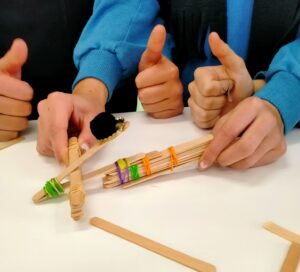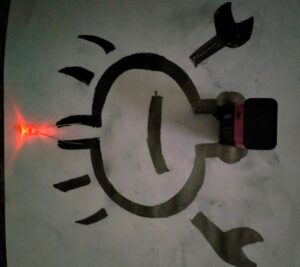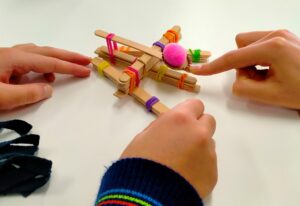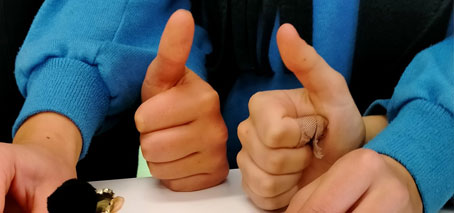
“One student told me she’d not previously considered science as a career, as it all seemed too hard for her, but she was excited now by what she had achieved and learnt during the class”
Teaching energy, releasing creativity, and inspiring future scientists
FLEET and Monash volunteers used catapults, graphite circuits and diffraction goggles to create challenges for 250 Mater Christi College students competing to win their annual STEM Cup.
For the STEM Cup challenge, which is judged on teamwork, innovation and communication, FLEET designed two hands-on workshops that got middle and senior secondary students working in teams to create functional, yet innovative circuits and catapults, and to then communicate the physics that underpinned their creations.
FLEET and Alex Tritt from Monash School of Physics and Astronomy developed a third workshop that challenged the students, through exploration of optics, lasers and diffraction gratings, to understand and explain the behaviour of light and its importance in physics research.
FLEET/Monash volunteers Alex Tritt and Michael Barson (optics workshop), Jason Major and Grace Causer (catapults/graphite circuits) and Imogen Stephenson and Taylor Christie (graphite circuit) guided the students through each activity and used that opportunity to engage with students about their own research and the career opportunities in physics.
“I had a really nice conversation with one junior school student who told me she’d not previously considered science as a career, as it all seemed too hard for her, but she was excited now by what she had achieved and learnt during the class,” says Women in FLEET Fellow, Dr Grace Causer.
Getting hands-on
Students got to don diffraction goggles in the optics workshop and check out what happens when you look at different light sources. The unexpected optics that the students observed got them discussing and asking questions.
“The students discussed the parallel between diffraction of the coloured lasers/lights and the rainbow patterns visible looking at white lights using goggles,” says FLEET Research Fellow, Michael Barson.

Let there be light! Students use graphite pens to draw electrically-conductive circuits that will light up an LED, an opportunity to discuss electrical resistance and connect with FLEET research themes
One objective for the catapults and circuits activities was for students to build a functioning circuit or improved catapult.
There was serious firepower in some students’ catapults and some good teamwork to create them, which was tested in the competition for the modified catapult that could fling a projectile furthest.
Luckily, students were also judged on their creativity….
“Some catapults had more creative energy than kinetic or potential energy, but the competitive spirit did push the concept of sci-art to a new level,” say FLEET outreach coordinator, Jason Major.
The circuits also released students’ creative spirit. In the graphite circuit workshop, students got competitive and constructed long, functional circuits, but they could also describe the concept of resistance to explain why their LEDs got dimmer the further they got from the battery.
They also created a new type of art…
“It was satisfying to see that most students got resistance and could relate this to FLEET’s research to develop low-energy electronics, but for pure aesthetics their circuits were truly creative,” says Monash School of Physics honours student Imogen Stephenson

Student’s catapult designs were graded on both effectiveness (conversion of stored to kinetic energy) and creativity
A huge thank you to Michael, Alex, Grace, Imogen and Taylor for taking on a formidable challenge of running these workshops. And special thanks to Michael and Alex, who had to develop the Optics workshop at the last minute and run it untested when another facilitator group had to pull out at short notice.
- Taylor Christie – PhD student (FLEET-Monash School of Physics and Astronomy)
- Imogen Stephenson – Honours student (Monash School of Physics and Astronomy)
- Alex Tritt – PhD student (Monash School of Physics and Astronomy)
- Grace Causer – Women in FLEET Fellow (FLEET-Monash School of Physics and Astronomy)
- Michael Barson – Research Fellow (FLEET-Monash School of Physics and Astronomy)
- Jason Major – Senior Outreach Coordinator (FLEET)

